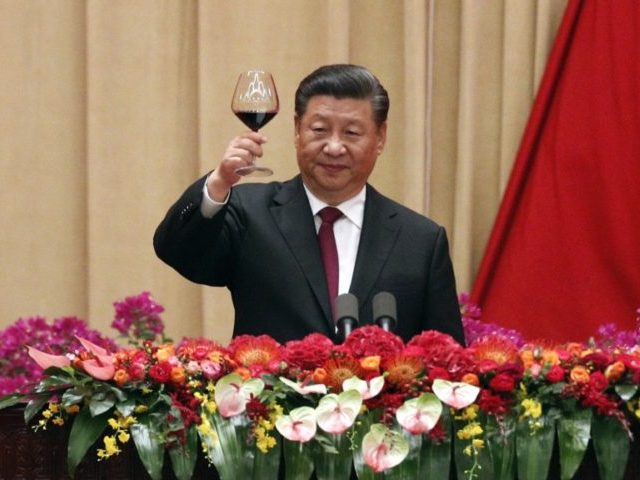Hong Kong Chief Executive Carrie Lam once again left the embattled city to meet with Chinese dictator Xi Jinping in Shanghai on Monday, who said he had a “high degree of trust” in Lam to “improve the social atmosphere” in the city.
Millions of people in Hong Kong have taken to the streets on a near-daily basis to protest communist encroachment into its government. Imposing Chinese Communist Party laws is illegal in Hong Kong under the “One Country, Two Systems” policy both sides agreed to when the United Kingdom departed the city in 1997. Protesters say Beijing is blatantly disregarding the policy, attempting to strip Hong Kong of its autonomy and impose the same repressive and failed system it had used to sink the rest of the country.
Protesters have made five demands of their government: the withdrawal of a legislative bill that would have allowed the Communist Party to extradite “criminals;” freedom for political prisoners; an independent investigation into police brutality; an end to calling protesters “rioters;” and direct election of lawmakers and other top officials. They have not officially demanded that Lam resign, opting instead to demand the right to vote her out of office, which they currently do not have.
Lam agreed to withdraw the extradition bill in September but has refused to address the other four demands.
The Hong Kong chief was in Shanghai to attend the China International Import Expo, an international economic conference meant to attract further investment in China’s repressive communist economy.
Chinese state media reported that Xi was pleased with his meeting with Lam.
“Lam has led the SAR [Hong Kong Special Administrative Region] government to fully discharge its duties, strive to stabilize the situation and improve the social atmosphere, and has done a lot of hard work,” China’s Xinhua news agency reported Xi as saying. “Xi voiced the central government’s high degree of trust in Lam and full acknowledgement of the work of her and her governance team … ending violence and chaos and restoring order remain the most important task for Hong Kong at present”.
Xi declared that “ending violence and chaos and restoring order remain the most important task for Hong Kong at present” and urged Lam to enact “unswerving efforts to stop and punish violent activities.”
Xi did not address the fact that most of the violence perpetrated in Hong Kong has been at the hands of his supporters, pro-China mobs that have taken to gruesomely assaulting pro-democracy protesters. In the most recent example of this phenomenon, a man speaking Mandarin – the language native to Beijing, not Hong Kong – went on an attempted stabbing spree at a local mall where protesters had gathered, then bit the ear off of local district councillor Andrew Chiu (Chiu has since had his ear surgically re-attached).
Protesters have engaged in targeted acts against state-run organizations and buildings. Before Lam agreed to withdraw the extradition bill, protesters stormed the headquarters of the Legislative Council and destroyed all the equipment and space necessary to pass laws – being careful to avoid any vandalism or looting of parts of the building that were not directly related to lawmaking.
Similarly, this weekend, protesters attacked the Xinhua news agency’s offices in Hong Kong, which Xinhua described in an official statement as “barbaric.”
Lam’s administration expressed optimism at Xi’s reception on Monday.
“I think the very fact that he is so busy, that he found time to really meet the Chief Executive, really it’s a vote of confidence in ourselves. And also, what he said, as reported in the papers and in the media, is also very positive,” Matthew Cheung, the official acting as chief executive in Lam’s absence, told reporters. “He has a high degree of confidence in the chief executive and also certainly recognize the positive work of the present government and also particularly the political teams. All of this is pretty reassuring to us.”
Xi’s public statements on Hong Kong, which have been rare since the protests began, alarmed some in the pro-democracy community who see it as the dictator granting Lam permission to use even more violence to silence protesters.
“Since Carrie Lam gets the high degree of support from the central government, coming from Xi Jinping, we can imagine that the use of police force, the allowance of police brutality will be escalating in future,” Wu Chi-wai, the chairman of Hong Kong’s Democratic Party, said on Tuesday. “That means the police can have all the power to influence the public policy in Hong Kong. That should not be the way Hong Kong should go on if the city wants be a part of the international community.”
Wu feared the Beijing would attempt to use the same ruthless violence it does within Communist Party territory to silence Hong Kong’s protesters, who grew up accustomed to freedom of expression.
“The only experience they have in the mainland [China] cities, they rely on police force, rely on police violence to crack down on demonstrators and calm down the situation. But Hong Kong is different,” he said.
In addition to attacks by pro-China mobs and individual criminals, the pro-democracy movement has faced increasing violence at the hands of police. In perhaps the most prominent case of police brutality, officers blinded a woman by shooting her with a bean bag round at a range the police force does not legally allow; the woman has chosen to remain anonymous, though protesters still wear eye patches in solidarity with her.

COMMENTS
Please let us know if you're having issues with commenting.